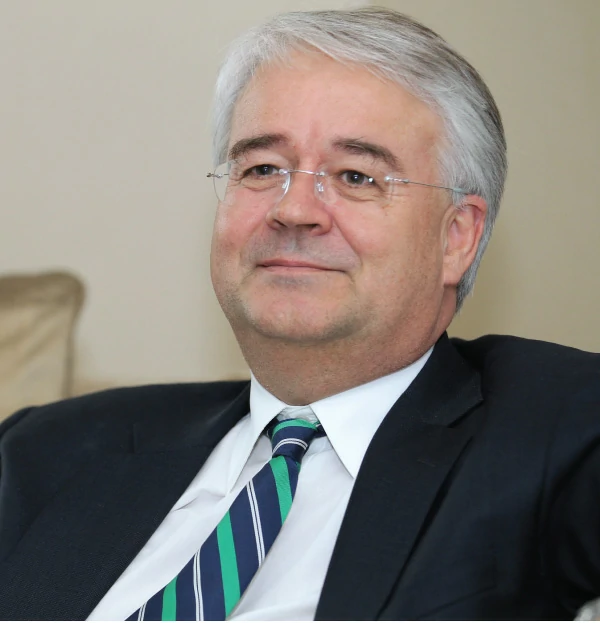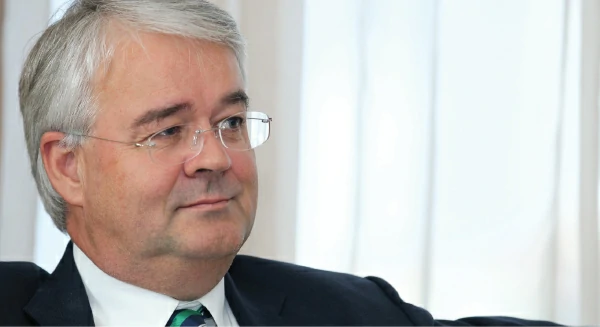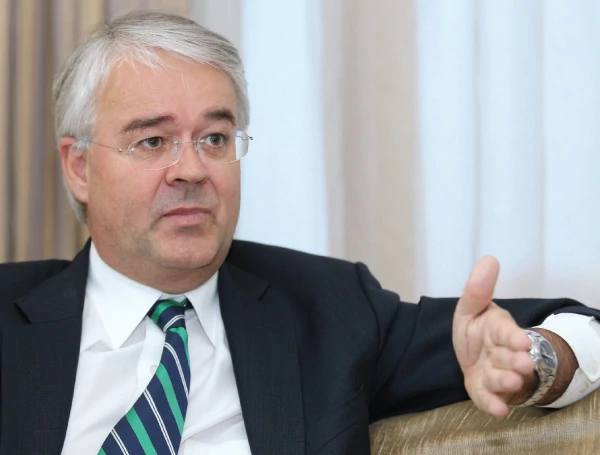
Michael Andrew, Global Chairman of KPMG comes with a multitude of experiences garnered through his travels to over 90 countries and exposure from the various positions he has held throughout his career. He stressed the need for the West to understand the Eastern way of doing business and that the secret is to adapt and develop according to the environment and context of the host country. His outlook for Sri Lanka is positive as the country forges ahead with political stability, transparency, implementation of IFRS, developed infrastructure and eradication of corruption.
By Udeshi Amarasinghe
Photography Menaka Aravinda
You have been with KPMG for more than three decades, can you explain to us your journey to your current position as the Global Chairman?
Interestingly, I began my career in industry. As a university student I did vacation work at ICI in their legal department over two years. As part of their graduate training they sent me to be a cost accountant to an outside business for another two years. Later, I became a Tax Manager and they asked me to go to Papua New Guinea. With a young family this was not the move I was looking for. Therefore I joined Peat Marwick as a Tax Consultant in 1984 and in 1988 I became a partner. On the very first day I became a partner they sent me to Amsterdam. At that stage Peat Marwick was becoming part of KPMG and they wanted someone, a lawyer to help them with the merger. That was in 1988 and then I was invited back to Amsterdam from 1992 to 1994 to run KPMG’s international tax practice, which involved not only developing the tax strategy but also writing the first Asia Pacific strategy and setting up offices in Eastern Europe.
Once I returned to Australia I was appointed as the Chairman of Asia Pacific Tax. In 2001 I became the Managing Partner of the Melbourne office, which employs about 1,800 people, one of our largest offices, and I was subsequently elected as Chairman of the Australian firm. Following which I was elected as the Chairman of Asia Pacific and then early this year I was made Global Chairman of KPMG. I am now based in Hong Kong, which is much more convenient compared to Melbourne considering the travel required in a limited time frame.
If we look at your experience, it basically stems from the Australian and the Asia Pacific Region. How would you translate your experiences and lessons learnt to a more global perspective?
First of all I can say my background with KPMG is very global. I have been to 91 countries around the world and I have looked after BHP Billiton, for example, which operates in 70 countries. I think today the Asia experience is critical. I have learnt that the West needs to better understand the markets in the East as well as the governing structures that operate here. In a recent speech I explained that too many people underestimate the Eastern way of doing business, which is more consensus driven and long-term, with clear direction and focus in their strategy and a broader set of stakeholders. In the West, business tends to focus more on the short-term. therefore, There isn’t enough emphasis on creating long-term sustainable value. The key to doing business in this part of the world is to understand the local environment and adapt your business model accordingly.
KPMG recorded a 10.1 percent increase in revenue during the past financial year. What is the significance of this and how was this achieved?
The significance of 10.1 percent increase in revenue is that it was the largest growth of the big four accounting firms. We achieved this by focusing on our core strategy, which emphasises winning in high-growth markets. We have basically been investing in these service lines and geographical markets, which include the bigger countries such as China and India, as well as looking at the next G-11 countries.
What are the important markets for KPMG?
Well, all markets are important, we have to define them by service offering. Audit is our core business; it defines our brand. That too is under huge pressure at the moment, in terms of regulatory, cost and liability issues. But really the core markets for us are the financial services, healthcare, energy and management consultancy, which is based on large scale transformation as well as business efficiency. Geographically, the key growth markets are China, India, Africa, Russia, Korea, the Middle East and South America.
Too Many People Underestimate The Eastern Way Of Doing Business, Which Is More Consensus Driven And Long Term With Clear Direction And Focus In Their Strategy And A Broader Set Of Stakeholders. The Secret To Doing Business In This Part Of The World Is To Understand The Local Environment And Adapt Your Business Model Accordingly.
Looking at the Asian Region, the economies of India and China are booming, and the effects of the recession and the debt crisis in OECD have not affected this region as much. in this light, what plans does KPMG have for Asia in general and more specifically Sri Lanka?
The recession in the West is starting to be felt by India, China and the Asian region. This is inevitable especially because of decreasing trade flows. India and China are now transitioning into growing their domestic economies, meeting middle class aspirations and reforming their institutions. This is all good business for KPMG. In terms of Sri Lanka, KPMG will always have a strong position. We continue to be a dominant audit firm here. Our focus now is to grow into management consultancy, because the country is seeing good growth in tourism, agriculture, services, low cost manufacturing and moving up the value chain. In that sense, this requires a different suite of products for us to provide greater value in these markets. The other important factor in Sri Lanka is the implementation of IFRS. This is a huge task for companies here because it is not just about the accounting; it is about your systems, it is about the way you report to the market place, it is about the way you reward shareholders and employees, it is the way you educate your analysts, it is the way banks allocate capital and risk. Therefore, this is a massive process of reform and we are very focused on making sure we have sufficient staffing to meet the demand.
If you look at the current situation in Sri Lanka, how does the country compare globally?
We Need To Strengthen Corporate Governance. From Our Perspective We Stress The Importance Of High-Quality Audit Committees. If You Have A High Quality Audit Committee Then You Generally Have A High-Quality Audit.
Sri Lanka has been relatively insulated from the global economic crisis. The banking system is in reasonably good shape, you have a good growth story, social inequity issues are being addressed, there is a good government at the moment and there is political stability, therefore you are actually seeing a very good enabling environment. The challenge is that it is still a relatively small market. 22 million people is about the same size as Australia, and when you compare that to India with a billion, China a billion, people tend to forget or overlook these types of countries. But Sri Lanka is a very good niche opportunity for global businesses.
Going forward, will KPMG be focusing more on emerging markets?
Very much so, this is our strategy. We will look at the high growth opportunities and make sure that we have a good base. This actually differentiates KPMG from the rest; the very fact that we have local ownership means that we are local on the ground, we understand the marketplace and the culture of the people. Therefore we are in a good position to give advice to succeed in these markets, whereas some tend to run these businesses from overseas. As a result they do not really understand the local nuances and why such things exist, so to speak. Therefore it comes back to what I mentioned earlier, it is really important as a global investor to understand the local conditions in the marketplace, which means the West must understand the East much better.
If we look at what’s happening in the US and EU, firstly what are your thoughts on the present crisis? Secondly, looking from outside it seems like the action taken is too little too late. What can be done to come out of this downturn?
There are a number of different solutions. Europe has a relatively good plan; they are quite clear of what needs to be done, but implementation is difficult given the current political environment. The positive aspect is that countries like Germany are now starting to really dictate the strategy and agenda. This means not just looking at the short term issues about how to provide stability in the market but tackling the longterm cost structure issues that focus around introducing austerity measures, governance reform and more fiscal coordination across Europe.
In the United States, the main problem is the public sector debt issue. In our experience the companies are in very good shape, consumers are de-leveraging but the US Government needs to take leadership and interest in its fiscal deficit. However, currently there is no political consensus.
Can you elaborate on the mechanisms that KPMG has put in place to face the changes in this economic environment?
Like all businesses, we are looking at cost structures and to see if there are ways of making it lean, looking at smart business models to basically adapt to these changing conditions. For example, we have just introduced a shared services centre in Prague, a regional hosting structure for our team in Singapore and our knowledge centre is based in Bangalore, India. We are looking to centralise our investments into low-cost high-quality jurisdictions to give us better service capability. We are also looking at standardising our front office products using smart technology to really capitalise on knowledge sharing.
If we look at the rules and regulations that govern economies and financial institutions, at times especially when issues arise, it seems like these rules and regulations are quite redundant. Should these not evolve with time as well. What are your thoughts on this?
Clearly there are lessons to be learnt from every financial crisis because they tend to repeat themselves eight or nine years later. Therefore we need to discuss and suggest institutional reforms that can be made. It is apparent that better coordination is required between regulars and the audit profession so that we can exchange information. The rating agencies have to be far more independent in the way that they actually tackle impending issues.
We need a more global institutional governance framework, particularly in the financial services sector, where there is prudential supervision.
Many countries have really good prudential supervision systems but others don’t. We need to strengthen corporate governance. From our perspective we stress the importance of high-quality audit committees. If you have a high-quality audit committee then you generally have a high-quality audit.
So who should take the step first?
It is a shared interest, we all have to play our part to restore confidence in the capital markets. We need to come forward with constructive suggestions on how to improve the quality of audits. The regulators need to come forward on how they can improve the quality of regulation. Politicians need to start to understand the importance of taking a longer term view around these issues.
In the recent past both internationally as well as locally we have seen the collapse of financial institutions, fraudulent behaviour and also issues such as insider trading. Now at times like this the first question most people ask is: What is the role of auditors? What are your thoughts on this and is it fair to point the finger at the auditors first?
No it is not, basically all these are failures of business models. Our job is to basically see if the historic or financial information has been correctly brought to the marketplace and to make sure that there is a proper internal control framework. We are never going to deal with all the issues that affect financial markets. In fact, if you actually look at the 2008 recession, the auditors did an excellent job: we got on the front foot, we marked down the values of securities and we were criticised for being too tough. Whereas in 2003, when we had Enron, WorldCom and Tyco, there was valid criticism of the audit profession, this time it was aggressive leveraging, failure to properly recognise and mange risk as well as a lack of prudential supervision and effective regulations in some instances that caused the problem to arise.
What is the role of the auditors today?
The role of the auditor is to enhance the reliability of the company’s reporting. Companies prepare financial statements, they produce information, which investors and stakeholders rely upon. We have to make sure that information is correct and valid, accurate and relevant. We need to examine where our role should extend further in terms of the conversations that we have with the regulators; communicating to the market what our key judgments are, and also whether we should opine on factors such as the risk environment. For example, in the US we have Sarbanes–Oxley which requires audit companies like us to comment on the mangement’s assessment of the company’s internal control over financial reporting. This doesn’t exist in many other countries. We need to standardise the global framework to ensure that we have a robust reporting process that capital markets can rely on.
In this current context, accountability, transparency and then corporate governance is essential. How can these aspects be improved globally and more specifically in Sri Lanka?
In Terms Of Sri Lanka, We Are Seeing Much More Political Stability, Transparency, Introduction Of IFRS And Trying To Move Up The Current Indices For Ease Of Doing Business In The Country. Therefore The Aspects That The Country Can Capitalise On Are Strong Institutions, Good Infrastructure, Clear Political Stability And Elimination Of Corruption.
Globally, it’s a question of introducing ethical behaviour and making sure that we impose sanctions on poor behaviour and making examples of people who do not comply in this sense. We also need to have a much more open and transparent conversation with the market, with the regulators, with the politicians when these problems arise. Therefore, if you have a series of principles to underline the system, this is really important in giving confidence to the marketplace.
In terms of Sri Lanka, we are seeing much more political stability, transparency, introduction of IFRS and trying to move up the current indices for ease of doing business in the country. Therefore the aspects that the country can capitalise on are strong institutions, good infrastructure, clear political stability and elimination of corruption.
What can you tell us about your visit to Sri Lanka, what do you hope to achieve?
We have formulated our objectives for the next five to six years. Our job now is to go out there and discuss with our clients who are looking for foreign investments and explain to them about the way this country is transforming and changing. As a country with a population of 22 million that is relatively young, improving the infrastructure and political stability, Sri Lanka will be of great interest to our foreign investors.







